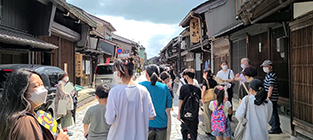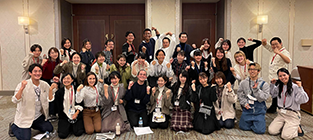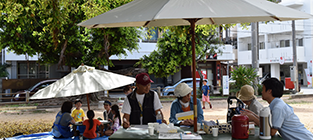The Japan Foundation Prizes for Global Citizenship (2022)
Awardees (in geographical order)
Alece Takaoka
- Representative
- AOKI Yuka
- Year of Establishment
- 2010
- Website
- https://www.alece.org/
- Social Media Accounts
- https://www.facebook.com/alecetakaoka/
- https://twitter.com/alecetakaoka

Activity Outline
When Alece was originally established around 2010, it was a given that children with foreign roots in Toyama prefecture were unable to learn and go on to higher education. Furthermore, this strange situation was never even raised in public awareness, let alone discussed. Therefore, we launched a learning support class to do anything we could to help these children in front of us. About ten years has passed since that time. The children from that time have grown up to be adults and built lives in the community, and the number of their children born and raised in Toyama have been steadily rising. However, the situation facing the children still remains problematic. But meanwhile, the immediate situation in the community we live in is population decline due to a rapidly declining birthrate and aging population, and the shrinking and tightening of the local economy. Can we continue to overlook the potential of our children in this situation? In fact, it is those children with foreign roots, with their ability to see things from multiple perspectives and the flexibility to respond to change in the midst of multiple languages and cultures, who can take a crack at stagnating communities and global issues.
Alece Takaoka carries out citizenship educational projects which aim to build a new future for communities by leveraging the true potential of children with foreign roots. This is an educational project to help all members of the community become citizens, or people who aspire to and practice a democratic and independent way of life in coexistence with others, with a focus on children with foreign roots. Through methods such as lectures, an SDGs forum, and a film festival that remove the traditional filters applied to support, we involve countless different people in the community to overcome diverse differences and work together to solve problems. By demonstrating the potential of children with foreign roots in that process, we expand the circle in which the value of diversity is shared. We also reexamine our own educational activities from the standpoint of citizenship in order to build new relationships with the children.
Alece Takaoka will continue to work toward the creation of a society in which the norm is people with different backgrounds working together to create new values through mutual support and assistance, and through recognizing the inherent value in each other.
Reasons for the Prize
Model activities for multicultural coexistence by leveraging the diversity of communities with many foreign residents.
Alece Takaoka is an organization engaged in educational support to enable children with foreign roots to build bridges between their root countries and Japan and to contribute to the local community. Takaoka city began hosting countless foreign laborers in the 1990s, and children with foreign roots have come to study at Japanese schools. The organization was formed in 2010 to tackle a variety of related issues. Since FY2020, the organization has gone beyond the framework of support for the children with foreign roots by developing an educational program that enables all members of the community to become citizens who understand and respect their mutual differences and accept diversity. Given the high population of foreign residents, there are many practical challenges, and the organization is working hard to achieve a multicultural society and contribute to revitalization of the local community.
Comments from the Awardee
Takaoka is an area with a high foreign resident population, but also a conservative community with few human or financial resources, and the very existence of children with foreign roots is not well acknowledged. Given this situation, we steadily worked through the darkness, completely devoid of light, driven by our belief in the potential of the children. We feel that the Japan Foundation Prize for Global Citizenship has served to finally bring light on our activities. That light is also shining on the potential of children with foreign roots. We hope to use this award as an opportunity for diverse children to open away to the future as citizens, on their own, and share it with the many people in the community.
Peace Culture Village
- Representative
- Steven Leeper
- Year of Establishment
- 2014
- Website
- https://www.peaceculturevillage.org/
- Social Media Accounts
- https://www.facebook.com/PeaceCultureVillage

Activity Outline
Peace Culture Village (PCV) is an NPO involved in peace education in Hiroshima. The organization, founded by Steven Leeper, former director of the Hiroshima Peace Culture Foundation which operates the Hiroshima Peace Memorial Museum, provides people of Japan and the world with opportunities to think about peace.
Hiroshima has continued to communicate to the world about the value of peace after recovering from the complete devastation after becoming the first place where a nuclear bomb was dropped in human history in 1945. Many of those who were active in this endeavor were survivors themselves, but communicating the message has become more difficult as those survivors age. It is estimated that 37% of survivor organizations will have difficulty operating by 2025. The number one reason is the lack of successors, while the second reason is a lack of funds. Under the slogan, “Create jobs that create peace”, PCV works to solve problems, educate successors, and create systems for sustainable peace activities.
Our diverse activities include operating the Peace Culture Academy online school for youths to explore peace, paid guide tours for organizations and schools run by Hiroshima youths, the management of workshops, the creation of activities to carry on these efforts using technology, and the provision of online programs directed to a global audience.
The organization provided programs for 10,000 people in 44 countries in FY2021, and plans to provide programs for a further 16,000 people this fiscal year. We also provide support for regional organizations through cooperation with Nagasaki, Kagoshima (Chiran), and Okinawa, regions that face similar challenges. We hope that our activities are of service to society.
We will continue to create sustainable peace activities from Hiroshima.
Reasons for the Prize
Communicating the importance of peace to later generations using technology and youth participation
Peace Culture Village, which operations a peace guide program and dialogue programs for visitors to Hiroshima from throughout the world, leverages online tours and XR technology to develop new initiatives with youth participation at a time when many similar organizations struggle to continue operations as the aging of their story tellers 77 years after the bomb was dropped. The organization planned online tours and classes in partnership with a travel agency after staff wondered what they could do with the lack of direct visitors to Hiroshima under the Covid-19 pandemic. They have also created a system by which youths can participate in paid work, and this system offers new possibilities not only for peace cultural activities, but for international exchange as well.
Comments from the Awardee
Thank you very much for presenting this prestigious award to our organization. For us, the concept of global citizenship is very important. Tanaka Toshiko, a survivor of the bomb, said to us, “Create friends all over the world. If you create friends all over the world, then you will think of their faces when a war starts. Then, peace will become a personal issue for you.” To create friends all over the world is a challenging dream, but we hope to create a better future by joining forces with our friends as global citizens.
Chiiki Support Wakasa
- Representative
- UEHARA Hiroyasu
- Year of Establishment
- 2005
- Website
- https://cs-wakasa.com/
- https://cs-wakasa.com/kouminkan/
- Social Media Accounts
- https://www.facebook.com/wakasakouminkan/
- https://twitter.com/wakasakouminkan

Activity Outline
Chiiki Support Wakasa is an NPO tasked with making the Wakasagaura community (on the west coast of Okinawa near Naha city) a brighter and more comfortable place to live. The organization was established in 2005 (and later became an NPO in 2007) by local residents and associations, the privatization committee, the local PTA, educational officials, and community center users, as a potential organization to manage the privatization of the local community center that was constructed in response to strong community demand.
The organization took over part of the operations of the Wakasa Community Center in 2010, and in 2015, it became the designated manager of the facility to carry out initiatives rooted in the community at the Center in cooperation with diverse organizations and institutions.
The organization promotes the creation of new initiatives while respecting such groups as single parent homes that are not part of community organizations, children in diverse environments, and the rapidly increasing foreign laborers and exchange students. To do so, the organization leverages their strength of community networking and follows their philosophy of “the ideal form of a community center and contemporary measures (established by the National Association of Community Centers, 1967) with the aim to increase the self governing ability of the citizens based on a spirit of respect for individuals.
Activities the organization carries out for this purpose that are attracting national interest include the Parlor Community Center program where they visit communities that lack community centers in the area, the Art Club artist tours, and their unique disaster prevention program.
The organization carried out a wide range of activities during the Covid-19 pandemic in collaboration with stakeholder organizations, experts, and other NPOs, such as providing food support for those who lost their source of income, such as single mothers in part-time employment and exchange students, and providing online information on Covid-19 measures in Easy Japanese.
Identifying and supporting the diverse groups within the community and expanding their activities leads to rich relationships through the overlaps thereof. We believe that through these ongoing efforts, we can achieve an inclusive local society that goes beyond individual attributes.
Reasons for the Prize
Community development through collaboration and creative support for resident activities
Chiiki Support Wakasa is an NPO tasked with forming resident led communities in the Wakasa region of Naha City, Okinawa Prefecture. The organization was founded in 2005 through local resident cooperation in order to take over the management of the local community center, a community treasure, when it’s privatization was planned. The organization has a high reputation for unique, quality programs and detailed communications in cooperation with artists, while also respecting self government and supporting the autonomous activities of local residents.
Under their motto, “leave no one behind”, the organization serves as a safety net for individuals who are not a part of local community structures, such as single mother, children from diverse family backgrounds, and foreign resident. The organization also supports the activities of Nepalese residents, who have been increasing in number in recent year, playing a role in exchange and mutual understanding with local residents.
Comments from the Awardee
Thank you very much for presenting the prestigious Japan Foundation Prize for Global Citizenship to our organization. We are extremely pleased to receive this award on the 30th anniversary of the opening of the Wakasa Community Center.
We work constantly on a daily basis to achieve a local community in which nobody is left behind by learning together with numerous institutions, organizations, and local residents. We are committed to making further progress, encouraged by the joy shared with our collaborative partners.
- What We Do Top
- Arts and Cultural Exchange [Culture]
-
Japanese-Language Education Overseas [Language]
- Japanese-Language Education Overseas [Language] Top
- Learn Japanese-language
- Teach Japanese-language
- Take Japanese-Language Test
- Know about Japanese-language education abroad
- The Japanese-Language Institute, Urawa
- The Japanese-Language Institute, Kansai
- Japanese-Language Programs for Foreign Specified Skilled Worker Candidates
- Japanese Language Education for Japanese Children Resident Overseas and for the Descendants of Migrants
- Archives
- Japanese Studies and Global Partnerships [Dialogue]
- JF digital collection
- Other Programs / Programs to Commemorate Exchange Year
- Awards and Prizes
- Publications
